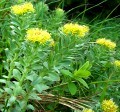 I’m forever fending off the alternative medicine brigade who seem to clump around this website and email me all kinds of supposed miracle cures that will spell the end of all health ills. One herbal remedy I recently focused on is Rhodiola rosea, in which I critiqued a promotional email from a vested interest in the product. They made all kinds of claims for this material on the back of very limited clinical trials. Needless to say advocates of alternative medicine commented aplenty.
I’m forever fending off the alternative medicine brigade who seem to clump around this website and email me all kinds of supposed miracle cures that will spell the end of all health ills. One herbal remedy I recently focused on is Rhodiola rosea, in which I critiqued a promotional email from a vested interest in the product. They made all kinds of claims for this material on the back of very limited clinical trials. Needless to say advocates of alternative medicine commented aplenty.
As a chemist, I take what I hope is a healthy and skeptical view of all the biochemical and physiological claims these people make for their products. I’m just worried that there are so many people who are perhaps desperate to fix their lives that they become easy prey for such marketing. Anyway, for those who feel a chemist has no place criticising their beloved remedy, I turned to a pharmaceutical expert in Sheryl Torr-Brown of the Future Trends in Health blog to provide some additional support for my argument. She has many years experience in pharmaceutical science and has no axe to grind and offers an honest appraisal of my original post and some of the comments left by Sciencebase readers.
A glance at the scientific literature covering this herb seems to be minimal and biased in the main, she told me, and as such she agrees with my argument.
“When dealing with alternative medicine,” she says, “it is not enough to be right if you want to avoid the attacks. You also have to be sensitive to the highly personal views of those who find benefit in the drug albeit most likely due to placebo effect.”
This is perhaps an important point. Yes, the placebo effect is valid, but these remedies are usually very expensive and people are often spending their hard-earned money on what amounts to sugar pills, something that should be avoided perhaps especially in the current economic climate when every penny counts.
“A major point that most of the non-scientific public do not understand is that there is no such thing as a safe drug, natural or not,” adds Torr-Brown, “The dose is the poison, as the father of modern toxicology, Paracelsus said in the fifteenth century. Anything and everything will be toxic if you have enough of it or it gets into the wrong place. Unfortunately, people are tired of Big Pharma advertising and the media frenzy around drug withdrawals.”
She points out that ‘natural’ is sounding better and better to many folks, despite the existence of natural belladonna, natural cobra venom, oh, and natural background radiation. In the age of the Internet, it is now very easy to get positive anecdotes about anything. “Basically, one can decide what one wants to believe and then go find the evidence to support it,” Torr-Brown adds, “For scientists, we look for controlled studies to prove a point, whereas the general public are happy with a personal story or two of success.”
Many people, including several of the original, negative commenters on my R rosea post, are grasping to find something that works for them. “You cannot discount [some of these views] from a human perspective, but it makes no sense scientifically, adds Torr-Brown, “I am shocked by the number of people I know who pay huge amounts of money for the latest panacea only to give it up after a couple of months, usually due to lack of interest.”
Related articles by Zemanta
- Innocent children and the most vulnerable can be hurt the most
- £200m boom as demand for ‘natural’ cures soars
- Rhodiola rosea
- How not to do a study on the efficacy of “alternative” medicine
- Rhodiola rosea